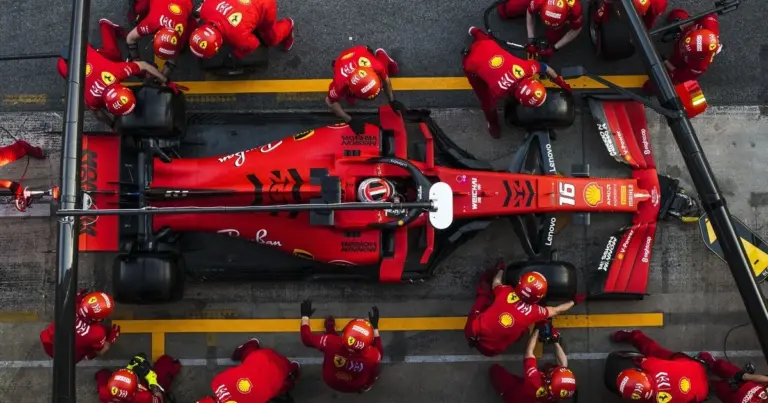The engineering triumphs witnessed during a Formula 1 races are as much a testament to the skill and precision of the drivers as they are to the teams of engineers who work tirelessly behind the scenes. F1 engineers are the unsung heroes who ensure that the racecars perform at their peak, and their salaries reflect the high level of expertise and commitment required in this fast-paced field.
Starting from the design and development phase to the execution and maintenance during races, the role of an F1 engineer is integral to a team’s success.
Salaries for F1 engineers vary widely depending on experience, level of responsibility, and the team’s budget. Graduate engineers stepping into the field can expect to earn at the lower end of the scale, while seasoned professionals such as senior and chief engineers command much higher salaries. Factors such as individual skillset, the engineer’s role within the team, and even the competitive success of the team can influence earning potential. Moreover, benefits and additional compensation often accompany base salaries, making this a lucrative career for those with the drive and talent to succeed.
Key Takeaways
- F1 engineers play a vital role in the performance and success of Formula 1 teams.
- Salaries for these engineering roles vary according to several factors, including experience and team success.
- Compensation packages in this field can be enticing, often inclusive of benefits and bonuses.
Overview of F1 Engineering Careers
The career of an F1 engineer is marked by a combination of specialized education and high-level expertise. These professionals are central to the success of a Formula 1 team, handling complex engineering challenges under pressure.
Path to Becoming an F1 Engineer
To become an F1 Engineer, candidates often start with internships or entry-level positions in smaller motorsport categories. They typically progress through the ranks, acquiring practical experience and demonstrating their skills in various engineering roles. Networking within the industry plays a crucial role in advancing one’s career to reach the pinnacle of motorsport engineering in Formula 1.
Educational Background
An aspiring F1 Engineer generally needs a robust educational background, usually a degree in mechanical, automotive, or motorsport engineering. The qualifications for this career start with a solid foundation in mathematics and physics, alongside specialized courses that cover topics unique to motorsport engineering.
| Required Qualification | Description |
|---|---|
| Engineering Degree | A Bachelor’s or higher in a relevant field of engineering. |
| Specialized Training | Courses in vehicle dynamics, aerodynamics, and propulsion systems. |
| Continuous Learning | Commitment to staying updated with the latest technological advancements. |
Roles and Responsibilities
Roles and Responsibilities of an F1 Engineer can vary widely, from design and simulation to trackside support and data analysis. They work closely with drivers to optimize performance, maintain the race cars, and develop strategies. Job specifics depend on the engineer’s specialization, which might include aerodynamics, powertrain, telemetry, or race strategy.
- Design Engineers: Focus on vehicle components, employing computer-aided design (CAD) software.
- Performance Engineers: Analyze data, interpret driver feedback, and contribute to the car’s setup.
- Systems Engineers: Ensure all car systems operate correctly and within regulations.
- Race Strategists: Calculate and adjust race strategy based on real-time conditions and simulations.
In summary, a career in F1 Engineering requires a blend of education, experience, and continuous adaptation to the fast-paced technological evolutions of the sport.
Salary Expectations for F1 Engineers
Formula 1 engineers’ salaries vary significantly based on experience, role, and team success. These salaries include base pay and may also comprise benefits and bonuses that enhance the overall compensation package.
Entry-Level Salaries
New graduates entering the field of Formula 1 engineering can expect a starting salary ranging typically from $30,000 to $40,000 per year. Benefits are often included to supplement this starting salary, which aid in making these positions competitive for individuals entering the field.
Average Salaries by Experience
As engineers gain experience, their earnings increase substantially. A junior or associate engineer, who may have a few years of experience, can earn between $40,000 and $85,000 annually. With even more experience in the industry, formula 1 engineers typically see their salaries rise, often reaching between $100,000 and $120,000.
| Experience Level | Expected Salary Range |
|---|---|
| Junior Engineer | $40,000 – $85,000 |
| Mid-Level Engineer (5+ years) | $100,000 – $120,000 |
Senior Engineers and Management Pay
Senior engineers with specialized skills, extensive experience, and managerial roles can command high salaries. The pay scale for senior engineers generally falls between $85,000 to $150,000. Those who reach chief engineer status can see their earnings exceed $250,000 per year. It’s notable that, in some exceptional cases, senior engineers with highly specialized expertise can earn upwards of $300,000, reflecting the critical role they play within their teams.
Additional Compensation and Benefits
In addition to their base salary, Formula 1 engineers often receive a range of additional benefits that enhance their overall compensation package. These benefits, aimed at both rewarding performance and improving quality of life, are a significant part of their total remuneration.
Bonuses and Incentives
- Team Performance Bonuses: Engineers may receive bonuses linked to the success and performance of their team. Achievements like victories, podium finishes, or championship wins can greatly increase their annual earnings.
- Individual Performance Incentives: Beyond team success, personal contributions to technological advancements or race strategy may also result in additional compensation.
Perks and Allowances
- Travel and Accommodation: Teams typically cover all travel and accommodation costs for engineers attending races and tests worldwide.
- Medical Insurance and Pensions: Comprehensive medical insurance and competitive pension schemes are often part of the benefits to ensure engineers’ welfare.
- Discounts and Extras: Engineers may enjoy perks such as merchandise discounts, ticket price reductions for events, and other company-specific benefits.
By offering these additional forms of compensation, F1 teams aim to attract top engineering talent and maintain a committed and motivated workforce equipped to handle the high-pressure environment of Formula 1 racing.
Factors Affecting F1 Engineer Salaries
In Formula 1, engineers’ salaries are influenced by several pivotal factors. Each variable can significantly impact their earning potential within this high-stakes industry.
Team Financials and Performance
A direct correlation exists between a team’s financial health and its performance on the track. Teams with robust budgets often allocate more resources towards employee salaries, and successful team performance can lead to better compensation packages for their engineers. These teams are more likely to reward their staff with bonuses, especially if they consistently secure top positions in the standings.
Engineer’s Experience and Seniority
An engineer’s level of experience and their seniority within a Formula 1 team structure are critical in determining their pay scale. Junior engineers are typically at the lower end of the pay spectrum, with salaries starting around $40,000. In contrast, more experienced engineers, especially those holding senior roles, can command salaries that exceed $80,000, reflecting their significant value to the team.
Market Demands and Scarcity of Skills
The market demands and the scarcity of specific engineering skills can dramatically influence salary levels. Engineers with specialized expertise in areas such as aerodynamics or vehicle dynamics, that are in high demand but low in supply, can negotiate higher salaries. As technology evolves, teams are eager to retain talent with such indispensable skills, often resulting in competitive salary offerings to attract and keep these highly skilled professionals.
Working Conditions and Lifestyle
Formula 1 engineering requires a blend of technical expertise and adaptability to a fast-paced environment. The working conditions and lifestyle for engineers in this exclusive motorsport demand a significant commitment to teamwork and often entail managing high-pressure scenarios.
Work-Life Balance
In Formula 1, engineers often face intense periods of work, especially during the racing season. The demanding schedule can lead to long hours of preparation and analysis both before and after a race weekend.
Balancing work and personal life becomes challenging, as they must remain responsive to the team’s needs during these critical periods. Despite these demands, teams may strive to provide rest periods and rotate staff to mitigate burnout risks.
Travel and Relocation
Travel is a substantial component of an F1 engineer’s lifestyle, with the race calendar taking them to circuits around the world. This translates into frequent travel and sometimes extended stays away from home, which can be both exhilarating and demanding, allowing engineers to experience diverse cultures but also requiring them to be highly mobile and adaptable.
Relocation opportunities may arise, as teams are based in various countries, primarily in Europe. Engineers may need to move closer to team headquarters or to regions strategic for the sport.
- Travel Frequency: Often, subject to the racing schedule.
- Common Locations: Global circuits; team bases in the UK, Italy, Germany, etc.
- Relocation: Possible and sometimes necessary for career progression.
Future Career Prospects
In Formula 1 engineering, a career’s trajectory can be steep, and success largely depends on performance, networking, and opportunities within the teams.
Career Advancement
Advancement for engineers within F1 is often merit-based. Talented individuals can progress from junior roles to senior engineer positions, contingent on their contributions to the team’s performance. For example:
- Junior Engineers can expect to start with salaries in the range of $40,000 to $85,000.
- Senior Engineers, with experience and proven skills, can move into roles with salaries ranging from $85,000 to $150,000.
- Those who excel might eventually become Chief Engineers, with salaries exceeding $250,000.
Paths to advancement may include:
- Specializing in high-demand areas of car performance.
- Gaining experience in race strategy or data analysis to become a Race Engineer.
- Leading a department or an innovation project, demonstrating capability in both technical and leadership roles.
Switching Teams or Moving to Different Motorsport Series
Engineers sometimes seek career progression by moving to different F1 teams that offer higher compensation or more significant opportunities for impact. Factors influencing such moves include:
- The success rate of the team: Teams with a strong track record may offer more stability and opportunities for growth.
- Professional network: Connections within the industry can facilitate transitions between teams.
- Resourcing: Teams with more resources can provide better tools and support for career development.
Alternatively, engineers may transition to different motorsport series where their skills can be leveraged effectively. Crossing over to series like Formula E or WEC (World Endurance Championship) can broaden an engineer’s experience and add valuable perspectives to their professional portfolio.
Industry Insights and Trends
The Formula 1 engineering sector is marked by constant innovation and regulatory changes, affecting how teams allocate resources and manage their talent pool.
Innovation and Technological Changes
Formula 1 has always been at the forefront of technological advancements. Teams invest heavily in Research and Development (R&D) to gain a competitive edge. This continuous push for innovation directly impacts engineer salaries as demand grows for professionals who can contribute to the development of cutting-edge technologies. Engineers who can navigate the network of systems and data to enhance car performance are particularly valuable.
Notably, engineering roles within F1 have evolved as teams have sought to integrate advancements such as Artificial Intelligence (AI) and Machine Learning (ML) into their strategies. These technological changes create new positions and demand a skill set that is highly specialized, pulling salaries upward as the supply of these specialized engineers struggles to meet team demands.
Regulations Impact on Engineering Roles
Regulatory changes by the FIA play a significant role in shaping engineering roles within F1. Regulations aimed at enhancing safety and promoting parity among teams can lead to significant shifts in engineering strategies. The introduction of budget caps, for instance, requires teams to optimize their operations and innovate within strict financial constraints.
F1 engineers must adapt to changes that may limit certain materials or design concepts, ensuring that their teams remain compliant while still competitive. The reshaping of roles that comes with regulatory modifications is reflected in the varying demands for different engineering specialties. Team principals and their technical staff must anticipate and adjust to these regulations to prevent any disruption to their operation’s efficiency and success, which in turn can affect the dynamics of compensation within the engineering teams.
Skill Development and Continuous Learning
In the competitive field of Formula 1 engineering, continuous skill development is crucial. Engineers need to keep pace with rapid technological advancements and industry best practices to maintain a competitive edge.
Specializations in F1 Engineering
An engineer in Formula 1 can pursue various specializations, ranging from aerodynamics to vehicle dynamics, electronics, and simulation. Each specialization demands a strong foundation in relevant STEM subjects and practical application of this knowledge:
- Aerodynamics: Engineers focus on the airflow around the vehicle, requiring a deep understanding of fluid dynamics.
- Vehicle Dynamics: This specialization deals with the forces acting on the vehicle during races and understanding the data to improve performance.
- Electronics: Involvement in the electronic systems of F1 cars, such as telemetry and sensor technology.
- Simulation: Engineers use advanced simulation tools to predict car behavior and improve design and performance.
Networking and Professional Growth
Professional growth in F1 engineering benefits significantly from networking and collaboration. An engineer’s ability to work effectively in a team and establish connections in the industry can lead to opportunities and career advancement:
- Teamwork: Success in F1 is highly dependent on teamwork, both within one’s own team and through collaboration across teams.
- Formula Student Team: Participation in university-level projects, such as Formula Student, can be a springboard for career growth, providing practical, team-based experience.
- Networking: Building a professional network is key. Attending industry events and joining professional associations can provide invaluable opportunities for learning and growth.
Frequently Asked Questions
In this section, readers can find concise answers to common questions regarding the salaries of Formula 1 engineers, offering a clear understanding of compensation within this high-performance industry.
What is the average salary for an F1 engineer?
The average salary for a Formula 1 engineer typically ranges between $40,000 and $80,000 annually. This figure, however, can fluctuate based on factors such as experience and the engineer’s role within the team.
How do Mercedes F1 engineer salaries compare to the industry standard?
Salaries for Mercedes F1 engineers may be higher than the industry standard, reflecting the team’s status as one of the leading competitors in the sport. Exact figures are confidential, but industry-leading teams often compensate their engineers well to secure top talent.
What compensation can a chief engineer in F1 expect?
A chief engineer in Formula 1 can expect to receive upwards of $250,000 a year, in addition to benefits. This reflects their senior status and the critical role they play in the success of the team.
What factors influence the salary of an F1 control engineer?
An F1 control engineer’s salary is influenced by their level of experience, technical expertise, and the performance of their team. Moreover, the importance of their role in developing car performance can significantly affect compensation.
How are F1 engineer salaries structured, including base pay and bonuses?
F1 engineer salaries are typically structured with a base pay complemented by bonuses. Bonuses depend on the team’s performance in races and championships, incentivizing engineers to directly contribute to the team’s success.
Are F1 pit crew salaries competitive with F1 engineer salaries?
F1 pit crew salaries are generally lower than those of engineers, considering the technical expertise required for engineering roles. Pit crew are highly skilled, but the compensation reflects different responsibilities and educational requirements compared to engineers.





